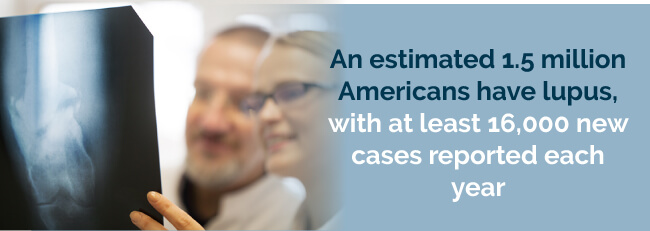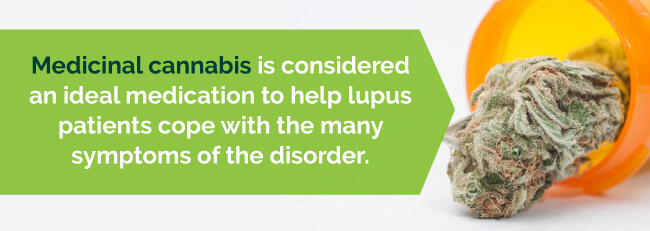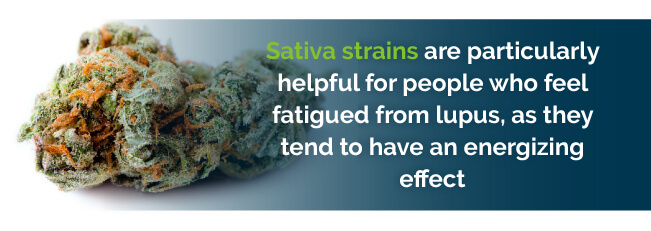
An estimated 1.5 million Americans have lupus, with at least 16,000 new cases reported each year. The effects of the disease can range from mild to life threatening. Patients often seek medical marijuana for lupus to control the symptoms since there is no cure for the disease. Understanding the relationship between marijuana and lupus helps you decide if it’s a suitable alternative treatment for you or a loved one.

As an alternative medicine, medicinal cannabis is considered an ideal medication to help lupus patients cope with the many symptoms of the disorder, such as immense nausea and debilitating pain. While medical marijuana is primarily known to be an anti-inflammatory, this alternative remedy can successfully suppress certain parts of the immune system. Let’s take a closer look at how weed causes these beneficial effects in the body.

Lupus is characterized by pain and inflammation. When you use medical cannabis for lupus, you can effectively treat both of those symptoms. By successfully lowering the levels of the body’s inflammation-promoting protein interleukin-2, and raising levels of the anti-inflammatory protein interleukin-10, cannabis shows that it may be beneficial for treating autoimmune disorders such as lupus where inflammation is the main complication. That inflammation is often responsible for pain in the body. Marijuana helps relieve that pain.
Since lupus is caused by an overactive immune system that attacks healthy tissue, suppressing the immune system may help relieve the symptoms you feel. Marijuana helps achieve this through the activation of myeloid-derived suppressor cells (MDSCs). Once activated, the MDSCs may help combat the hyperactivity of your immune system.
Find A Doctor Find A Dispensary
Research related to the use of medical cannabis is often limited due to federal regulations and the limited availability of cannabinoids to researchers. While there isn’t a lot of lupus-specific research available, many studies have shown effects of marijuana that can be beneficial for people with lupus.
One study looked at the effects of marijuana on the immune system. Researchers took blood samples from cannabis smokers and nonsmokers. The study found that the cannabis smokers had higher levels of interleukin-10, which may suppress the immune system, and lower levels of natural killer cells and lymphocytes, which enhance immunity. For the average person, decreased immunity is a negative, but in autoimmune diseases such as lupus, it could be beneficial.
While official studies and research are limited, many patients have their own anecdotal evidence that is enough to convince them of marijuana’s effectiveness. Many people suffering from lupus have found weed to be much more effective in treating their lupus symptoms than their prescribed medications.
Determining the correct medication is often a matter of trial and error with adjustments as you go, and, similarly, finding the right strain and ingestion method of marijuana for lupus takes some experimentation. Every patient’s symptoms are different and people’s bodies respond differently, so the cannabis treatment that works for one lupus patient may not be as effective for another.
Some patients use cannabis in conjunction with their current lupus treatments. The cannabis may provide additional relief beyond what the patient experiences from the traditional treatments. Marijuana may also help alleviate some of the side effects of traditional medicine. For example, if a medication makes you feel nauseous, weed may help ease that feeling. Other patients rely primarily on marijuana for treatment, or they gradually transition from traditional medication to marijuana. It is important to work closely with your care provider or a quality marijuana doctor to ensure your condition is treated properly. A lack of proper treatment for lupus could lead to more serious episodes with severe symptoms and potentially risky health effects.

Sativa strains are particularly helpful for people who feel fatigued from lupus, as they tend to have an energizing effect. Some Sativa strains to try include Super Silver Haze, Sour Diesel and Strawberry Cough. If you have trouble sleeping due to the pain and other symptoms of lupus, use an Indica strain, especially at night when you want to sleep. Indica strains create a feeling of sleepiness. Some options include Afghan Kush, Granddaddy Purple and Bubba Kush.
When you look at different marijuana strains, you see that they vary in the amounts of THC and CBD. Both cannabinoids can be beneficial for lupus. THC has a psychoactive effect, which gives you the feeling of being high. If you want to avoid that feeling, look for strains with low THC levels. Strains with higher levels of CBD often help patients in managing lupus symptoms. Some examples of those strains include Cannatonic, Charlotte’s Web, Harlequin, One-to-One and Sour Tsunami.
How you consume the cannabis for lupus also affects how well it works and how much relief you feel. Consider the following common methods and their pros and cons:
Some appropriate methods of using this alternative medication would be vaporizing an Indica strain at night to help with sleep and using a topical cream during the day to treat joint pain. You might also choose an edible at night to benefit from the longer effects of this type of ingestion.
Unlike traditional treatments used for lupus that can cause very unpleasant and sometimes severe side effects, patients who have used medical marijuana to treat lupus have significantly improved with no noticeable negative side effects. Some patients report feeling some minor side effects that generally go away once the marijuana wears off. Some of those potential effects include:
Some patients actually want some of the side effects. For example, if you are having trouble sleeping because pain caused by lupus keeps you up at night, the sleepiness as a side effect may actually help you get better rest. When compared to the potential side effects of traditional medicines, the side effects of marijuana are much easier to handle.
Many marijuana states allow the use of marijuana to treat lupus when certain qualifying conditions occur. The qualifying condition usually occurs when lupus causes chronic pain or severe nausea. Medical marijuana is a natural alternative to traditional lupus treatments without the side effects. If you or a loved one is dealing with lupus and you’re wondering if medical marijuana is a suitable treatment option, we can help. Let us connect you to hundreds of quality marijuana doctors across the country in all legal marijuana states. Cannabis could provide you with the relief you need from the pain and inflammation of lupus.
For more information about how cannabis can be used to treat Lupus, check out our resources:
Find A Doctor Find A Dispensary
Lupus is an autoimmune disease that causes your immune system to attack its own tissues and organs. Under normal conditions, your body produces antibodies to attack foreign invaders in the body. With an autoimmune condition such as lupus, the body creates autoantibodies that attack healthy tissue. Lupus is a chronic condition, meaning it usually lasts at least six weeks but often for years. The condition causes inflammation, which affects many different body systems, resulting in pain and damage in those systems. Lupus often affects the joints, skin, kidneys, blood cells, brain, heart and lungs.
Lupus is often difficult to diagnose because its signs and symptoms are similar to many other conditions, including thyroid problems, Lyme disease, rheumatoid arthritis and fibromyalgia. The most distinctive sign of lupus is a facial rash in the shape of butterfly wings unfolding across the nose and both cheeks. This rash occurs in many but not all patients.
The symptoms of lupus vary significantly in different patients. You may notice symptoms come on suddenly, or they might gradually develop. Some symptoms are temporary, while others are permanent. Symptoms range from mild to severe, with many patients experiencing episodes or flares of more intense symptoms, followed by a significant improvement. Because the disease affects different systems in each patient, the symptoms also vary depending on how the disease affects your body.
Some potential symptoms of lupus include:
In some cases, lupus causes complications that can be severe. These complications often affect specific body systems. Some possible complications include:
Lupus most often starts between the ages of 15 and 44, with women of childbearing age being the most common group to develop the disease. Lupus affects people of all ethnicities and races, but women of color have two to three times the likelihood to develop the condition than Caucasian people.

The specific cause of lupus is not known, but many researchers feel the disease stems from a combination of factors. Some possible triggers could include hormones, genetics and environmental factors, such as chemicals or viruses. Even things like emotional stress, exhaustion and certain types of drugs could trigger lupus. Some people may naturally have a higher tendency to develop lupus, which is then triggered by those potential factors. There is currently no cure for lupus, but treatment options can help control symptoms.
There are four main types of lupus, each with slightly different effects on the body. The type of lupus you have affects the treatment options.
The primary type of the disease is systemic lupus, which is the most common type and is the type that most people think of at the mention of lupus. Systemic lupus can affect the major organ systems throughout the body, with inflammation affecting the functioning of the kidneys, nervous system, circulatory system and other parts of the body. Symptoms in any of those body systems can range from mild to severe.
A second type of the disease is cutaneous lupus. This type of lupus only affects the skin, not the other systems of the body. Rashes and lesions appear on the skin. The most common type is a discoid rash, which appears in circular areas as raised, scaly and red without itching. Rashes and lesions can appear anywhere, but they often affect skin exposed to the sun. Cutaneous lupus can also cause skin pigment changes and hair loss. Roughly 10 percent of people initially diagnosed with cutaneous lupus eventually develop systemic lupus. It is possible that those people actually had systemic lupus from the beginning, but it initially only presented in the form of skin symptoms.
Certain legal prescription drugs cause drug-induced lupus. While many medications can cause the condition, the drugs most often associated with it include Hydralazine for high blood pressure, Procainamide for irregular heart rhythm and Isoniazid for tuberculosis. Symptoms are similar to systemic lupus but usually without affecting major organs. The symptoms usually go away within six months of stopping the medication.
While not a true type of lupus, neonatal lupus presents similar symptoms in infants. It happens when antibodies from a pregnant woman with lupus affect her baby in the womb. The symptoms upon birth often include a rash, liver problems or lower than normal blood cell counts. These symptoms normally clear up within months of birth, but the condition can cause serious heart defects in affected babies. Treatment options for babies of at-risk mothers are available.
Lupus has no cure, so the primary focus of the currently available treatments is addressing the specific symptoms. Since those symptoms vary from patient to patient, the medications and treatments used also vary. Patients typically work closely with their physicians to determine how to treat specific symptoms. The medications used may change frequently as you experience flares or have symptoms diminish.
Some common treatment options for lupus include: